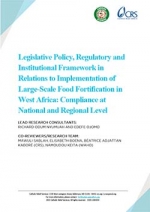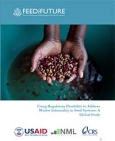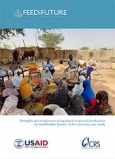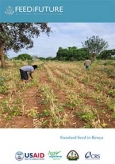Papers/Reports | January 10, 2024
Regulatory Framework of Food Fortification in West Africa
West Africa has made significant progress on harmonized mandatory standards on the levels of iron in wheat flour (60-ppm), folic acid in wheat flour (2.6ppm), vitamin A in vegetable oil (11-24ppm) and iodine in salt (15-45ppm) in most countries. These levels have been adopted by all Francophone countries and some Anglophone and Portuguese-speaking countries. There are however some variations in the inclusion of other micronutrients in wheat flour being fortified under mandatory standards and regulations in some countries in West Africa. There are some gaps in arriving at a fully harmonised standards as well as enforcement of regulations at the national levels. ECOWAS needs support to ensure a fully aligned harmonised standard that would achieve nutritional and sub-regional trade impacts of food fortification. This will further ensure that these are adopted and enforced at the regional level and by member states. Again, having a unified capacity reinforcement program for regulatory agencies and micronutrient analytical laboratories will result in equivalence in testing and enforcement across the region. The introduction of an Electronic digital platform on compliance enforcement will serve as a big push for transparency among stakeholders at the national level and across the region. Harmonized regulations and transparent information sharing through a digitalized system will yield the benefits of relevant data to be tracked by industry and governments, not just for trade but also for levels of micronutrients in fortified food in the region.
This report is a baseline study on the enabling environment for regulatory compliance for Large-Scale Food Fortification (LSFF) in West Africa. It reviews the policy, legal and regulatory framework across member states, assesses the capacity of public sector institutions to develop standards, enact regulations and enforce these regulations, and examines initiatives by ECOWAS/WAHO to the harmonisation of fortification standards in the region.





